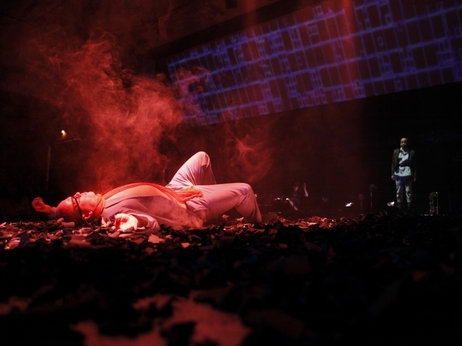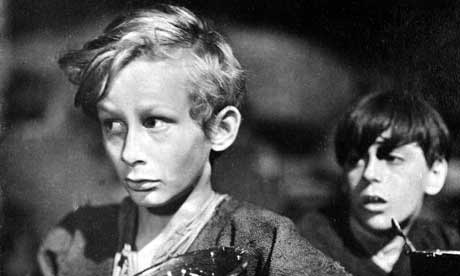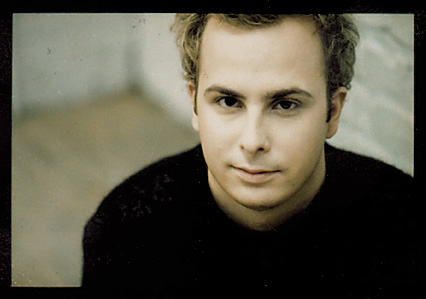Ever since she won Switzerland’s Got Talent, Maya Wirz has been the Alpine equivalent of Susan Boyle.

She has a Sony record contract with all the trimmings, and can hardly get her bus out of the depot in the morning for all the autograph demands. This Saturday she gets to sing with the Berne Symphony Orchestra in the nation’s foremost gathering place, in front of Parliament. Lavard Skou-Larsen conducts, and there’s an Italian tenor in support (no, not Paul Potts).

William Tell overture, anyone?
Here she is on youtube, singing outside her bus
You may recall the incident at the Tchaikovsky Comeptition when conductor Mark Gorenstein was accused of projecting racial abuse at the Armenian cellist Narek Hakhnazaryan and subsequently withdrew from the following rounds. Hakhnazaryan went on to win.

Well, Gorestein is now under attack from players in his own Svetlanov symphony orchestra, who have written to the Minister of Culture, saying the situation between musicians and conductor has reached ‘the highest boiling point’. They claim that 280 musicians have quit the orchestra in recent years after incidents with the conductor.
The Minister has told Ria-Novosti that he will deal with the situation once the conductor returns from illness.

LATEST: In an imterview with Moscow Radio today, Gorenstein came out fighting. He claimed someone had been planted in the orchestra to foment a plot against him…
I haven’t seen Ein Wagner Wiedergänger myself, but I know someone who has. Here’s Rebecca Schmid’s account, with her own pictures, from Berlin.
http://www.npr.org/blogs/nprberlinblog/2011/08/19/139791996/a-rheingold-for-the-21st-century


(c) Rebecca Schmid, all rights reserved
Much as I deplore TV talent shows, here’s a contest coming up where merit may actually play a role in determining the winner.
The Los Angeles casting agency below is lookig for singers who write their own material. The rules out precocious kids, cellphone salesmen and Su Boyle. If you fancy your chances, you’ve got three days to apply.

FOR IMMEDIATE RELEASE
Contact:
Morgan Fahey
Supervising Casting Producer
Budweiser Presents the Big Time
Radical Media
1630 12th Street
Santa Monica, CA 90404
Email: radicalmusicshow@gmail.com
DREAM OPPORTUNITY FOR TALENTED MUSICIANS LOOKING FOR THEIR BIG
BREAK!
HOLLYWOOD, CA – AUGUST 15, 2011
Radical Media and Budweiser are teaming up with award-winning producer Evan
Weinstein (“The Amazing Race”) to create an exciting new reality show offering three
lucky singers (who write their own music) a chance to demonstrate their skills on an
internationally recognized stage.
We’re looking for the musical performers who are almost ready to “break out” and take
their place among the world’s best. The three who are chosen will be provided with toplevel mentorship and will be filmed as they prove their skills in a series of exciting
challenges.
ONE singer will be given the performance opportunity of a lifetime at a sold out major
concert event. This opportunity is beyond anything that has ever been offered by
any music reality series.
All qualified applicants must be over the age of 21 as of August 26, 2011. Applicants
should submit a phone # where they can be reached, a recent photo, and brief bio to
radicalmusicshow@gmail.com. Our casting staff will contact them for further information.
We are accepting applications from both men and women.
ALL APPLICATIONS AND INQUIRIES MUST BE RECEIVED NO LATER THAN
FRIDAY, AUGUST 26, 2011.
Among many reminiscences received of the late Inge Tennstedt, one brought me out in tears of laughter. Inge had a lot to put up with as Mrs Maestro, but this night in Paris, remembered by former EMI man John Pattrick, was a bit special – even in the Tennstedt legend. Here’s John’s story:
Klaus was on tour with the Hamburg Radio Orchestra in Paris. Martha Argerich played Chopin 1 beautifully and received a massive ovation from the French audience who rightly worshipped her.
After this, Klaus conducted Mahler 1. The orchestra had one of those evenings when the playing was pretty average to say the least.

Klaus and the orchestra got a predictably bad reception and he went ballistic once he got to the green room. I went with Martha to see him but Inge came out looking nervous and worried – not normal characteristics for her – saying that this was not the right time! For good reason because what had happened was that Klaus had apparently picked up a pitcher of water and drenched the Leader and then told the Hamburg management that he was quitting the tour with immediate effect.
Kirill Kondrashin was then drafted in to complete the remaining concerts but then died on the rostrum during a rehearsal in Amsterdam. Klaus was, of course, mortified when he heard what had happened.

Worse still, EMI France had lined up, following the concert, the pick of every journalist in Paris for a dinner which Klaus never turned up to! I dread to think what Inge went through that night to calm him down! Klaus never sold in France even before this incident.
I am releasing on ICA Classics, Klaus’s 1986 broadcast of Mahler 3 from the RFH on CD as well as a DVD of Mahler 5 from 1988 (again RFH). Both are sensational – I have added a short interview which Klaus gives about Mahler 6 and you can hear Inge chuckling in the background!
My inbox went red last night with reports that Seiji Ozawa had pulled out of the second performance of Bluebeard’s Castle with the Saito Kinen orchestra in Matsumoto. The production marked his return from a year of cancer treatment and there were fears that he had done himself a mischief by accelerating his return. He is, after all, 75 years old.
Close associates of the conductor told me there was nothing seriously wrong with him. He took a break after the opening performance to husband his strength for the coming tour of China. Here’s an on-the-spot report from principal bassoon, Rob Weir:
He had been going in pretty high gear since the beginning of the festival and I think prudence kicked in after the first performance. He has a lot to do here and then on into the China part and it was better that he take a break now I think. A matter of pacing himself. His very capable assistant, Pierre Vallet, did a fantastic job last night and it made for a seamless transition due to all of Seiji’s detailed prep and first performance with us. The audience was ecstatic and fabulously supportive when the announcement was made.

However, Reuters now reports that Seiji has a minor bout of pneumonia, not bad enough to be hospitalised. “He is currently being treated for a light case of pneumonia and dehydration,” a festival spokeswoman said.
We wish him well.
Well, not quite. It breaks down to eight new shows in the main house and six on the Werskstatt studio stage.
And there’s a new venue – a converted former power station. Quite an enterprise to put on 370 events in a season.
Here’s the full release:

BARENBOIM’S 2011/12 BERLIN STAATSOPER SEASON FEATURES OPERA’S BIGGEST STARS IN THRILLING NEW PRODUCTIONS AND BELOVED REVIVALS
The 2011/2012 Berlin Staatsoper season, its second at the Schiller Theater while the company’s home on the historic Unter den Linden is being renovated, will feature eight new productions on the main stage as well as six additional new productions on the Werkstatt studio stage. In addition, there will be one visiting production, two operatic concerts, 19 operas from the repertoire, over 80 concerts, the annual Festtage series at Easter, the second year of the Infektion! festival of contemporary music theater, one new and four repertoire productions by the Staatsballett Berlin, a continuation of the Schlaflos in Charlottenburg series in the foyer, and numerous projects by the Junge Staatsoper. The Staatsoper’s program comprises an impressive total of 370 events during the season.
The Staatsoper’s season will open on 3 October 2011 with Leoš Janá?ek’sFrom the House of the Dead in a production staged by Patrice Chéreau and conducted by Simon Rattle. Following her Wozzeck production in 2011, Andrea Breth will direct Alban Berg´s Lulu for the 2012 Festtage, once again with Daniel Barenboim conducting. Further premieres will include The Bartered Bride by Bed?ich Smetana (Karl-Heinz Steffens/Balász Kovalik), Orpheus in the Underworld by Jacques Offenbach in a new production by Christoph Israel and Thomas Pigor (Christoph Israel/Philipp Stölzl), Il Trionfo del Tempo e del Disinganno by Georg Friedrich Händel (Marc Minkowski/Jürgen Flimm),Rappresentatione di Anima et di Corpo by Emilio de’ Cavalieri (René Jacobs/Achim Freyer) and Dionysos by Wolfgang Rihm (Ingo Metzmacher/Pierre Audi). With the premiere of Luigi Nono’s Al gran sole carico d´amore (Ingo Metzmacher/Katie Mitchell), the Staatsoper will inaugurate a new venue, the “Kraftwerk Mitte”, a former power station. A guest production from the Teatro alla Scala di Milano will see Daniel Barenboim conducting Mozart’s Don Giovanni, featuring Anna Netrebko and Christopher Maltman.
Two operas in concert will also be presented: Montezuma by Carl Heinrich Graun, starring Vesselina Kasarova and Pavol Breslik, and Bellini’s Normawith Edita Gruberova, Sonia Ganassi and Johan Botha. Daniel Barenboim will conduct the Staatskapelle in four concert programs as well as the traditional New Year’s concert, two charity events for the reconstruction of the Staatsoper Unter den Linden, a gala concert celebrating the tenth anniversary of the Jewish Museum Berlin, and three symphony concerts with both the Staatskapelle and the Filarmonica della Scala as part of the Festtage 2012. The concert soloists include Anna Netrebko, El?na Garan?a, Anne-Sophie Mutter, Alisa Weilerstein, Jonas Kaufmann, Maurizio Pollini and Radu Lupu. The Barenboim Cycle will offer collaborations with Christine Schäfer, Dorothea Röschmann and Thomas Quasthoff. In addition, René Pape will perofrm a song recital with Daniel Barenboim as accompanying pianist as part of the 2012 Festtage.
The Staatsoper will also present a six-part piano cycle featuring Daniel Barenboim as well as his colleagues Yuja Wang, András Schiff and Pierre-Laurent Aimard. On 30 June 2012 the performance of Mozart’s Don Giovanniwith Anna Netrebko at the Schiller Theater will be shown live on the Bebelplatz, followed on 1 July 2012 by a concert with Daniel Barenboim and the Staatskapelle Berlin.
Summer’s ending and everyone’s totting up their totals. I looked onto a friend’s screen the other day and saw a statistic so breathtaking she had to sit me down and make me a cup of tea.
When is an opera house full or sold-out? Usually when there’s just one or two hundred tickets left for sale. But what about a whole season – when is that ever sold out?
Glyndebourne ends in a week or so and the final tallies are being made. The four-month summer festival, unsupported by public funds, needs to sell 92 percent of tickets to break even. Recently it has been running along very nicely at 97 or thereabouts.
Many of the tickets are priced at £190 (same in Euros, or $350). That’s steep. Some £30 tickets are reserved for under-30s and £10 for standing room at the top balcony.
This summer, Glyndebourne has sold – wait for it – 99.18 percent of all seats to all shows*, including the less-obvious Rinaldo and Turn of the Screw that rarely sell out at major opera houses.

Put another way, Glyndebourne has been sold out all summer.
Beat that, anyone.

* Actually slightly higher by the last performance, five days later. See here.
John Howard Davies directed early episodes of Monty Python and the entire run of Fawlty Towers for the BBC. Reports of his death are coming in from entertainment industry colleagues.
As a child, he was Oliver Twist in David Lean’s memorable film.

As head of comedy at the BBC from 1977 to 1982, he was responsible for launching such classic shows as Only Fools and Horses, Yes Minister and Allo, Allo!
John was 72. Sad day.
Here‘s a BBC appreciation.

Ain’t No Mountain High Enough is one Nick Ashford wrote for his ever-loving wife Valerie Simpson.
He has died in New York, the same day as Jerry Leiber.

Yannick Nézet-Séguin is adding a week to his Philadelphia season and not charging for his services, my Montreal colleague Arthur Kapitanis reports. “It’s a wonderful sign of his commitment to the Philadelphia cause,” said Philadelphia Orchestra CEO Allison Vulgamore.
Hmmmm…. I wonder.
Given the states of Philly’s finances, a week’s maestro pay more or less won’t make much difference. The players will, of course, have to be paid for the week’s work. So what’s the point?
The players last week overwhelmingly rejected the board’s bankruptcy strategy, which stumbles from one confusion to the next.
A letter from the orchestra management (below) takes issues with these perceptions, but i see no reason to withdraw them. I know of several conductors who are quietly taking pay cuts to help their orchestras. No announcement is made, nor should it be. The fuss that Ms Vulgamore seems keen to make about Nézet-Séguin’s voluntary week strikes me as a publicity ploy to secure a mirage of support for her policy.
Your views?

Dear Norman,
We saw your blog post about Yannick Nézet-Séguin’s decision to volunteer additional time and services to The Philadelphia Orchestra and noticed two errors that we wanted to correct.
First, while Mr. Nézet-Séguin is donating his services to the Orchestra, the week he is now conducting – in November 2011 – is not newly added to the schedule as your blog indicates. Further, the Musicians of The Philadelphia Orchestra are not being asked to play an additional week beyond what is currently scheduled for 2011-2012 and thus, will not “have to be paid for the extra week’s work,” as you wrote. Nicholas McGegan, who was previously announced as the conductor of that week’s performances, has graciously revised his calendar to return to The Philadelphia Orchestra in April 2013 with the originally scheduled all-Bach program (Brandenburg Concertos 1-4 and Orchestral Suite No. 3). Mr. Nézet-Séguin will now lead the Orchestra in an Italian themed program, in its place, featuring Tchaikovsky’s Francesca da Rimini, Mendelssohn’s “Italian” Symphony, Verdi’s Overture to La forza del destino and Respighi’s The Pines of Rome.
Second, your blog notes that the Musicians of the Philadelphia Orchestra “voted last week 8-1 to reject the board’s bankruptcy strategy.” There was no vote taken of which the Association is aware to “reject the bankruptcy strategy.” Rather, a letter from the Musicians, expressing concern and dissent regarding certain aspects of the strategic plan, was received by Allison Vulgamore, President and CEO of The Philadelphia Orchestra, and Richard Worley, Chairman of The Philadelphia Orchestra Board of Directors, on the afternoon of Wednesday, August 17. However, this letter was only received by the intended recipients after it had been shared with a third party and printed in local media.
Corrections to your post regarding these important points would be very much appreciated.
My Best,
Kate Johnston
Kate Johnston
Assistant Director of Public Relations
The Philadelphia Orchestra
Peter Nero and the Philly Pops®
260 South Broad Street, 16th floor
Philadelphia, PA 19102
Gustav Mahler is centre stage at the 14th Beijing Music Festival, just announced. Details here. Press release below.

14th Beijing Music Festival (BMF) pays homage to Mahler
Crossover dialogues that “deconstruct” the classical Mahler
One of the major annual cultural highlights in the Chinese capital, the Beijing Music Festival (BMF) is dedicated to presenting high-quality classical music performances, commissioning new works and advocating outreach programs and music education for the general public. During the past 13 years, the BMF’s diverse programs traverse musical cultures both from China and the West, tradition and modernity, sharing with the audience both the profound cultural heritage and potent vibrancy of classical music.
2011 marks the centennial of the death of the great Austrian composer Gustav Mahler (1860–1911). The 14th Beijing Music Festival, which will open on October 6, wholeheartedly offers Beijing audiences a magnificent yet innovative musical commemoration. During the 25 days of this Festival, 22 concerts, ranging from symphonies, chamber music, solos, choruses, and all the way to jazz, will be presented. Among the repertoire are 18 complete works by Mahler. Apart from his complete symphonic output, his major vocal repertoire and the early piano quartet will also be presented. This also marks the BMF’s first foray in celebrating a single composer.
Conducting maestros Charles Dutoit, Christoph Eschenbach, Eliahu Inbal, Manfred Honeck, Yuri Temirkanov and Daniel Harding will collaborate with such illustrious Chinese orchestras as the China Philharmonic Orchestra, Shanghai Symphony Orchestra, Guangzhou Symphony Orchestra, China National Symphony Orchestra and Beijing Symphony Orchestra. Asia’s distinguished Singapore Symphony Orchestra is also invited to appear in the BMF this year. Throughout the 14th BMF, the output of Mahler—from complete symphonies to lieder and to chamber music—will be performed by the world’s best conductors and vocal artists. In addition to those listed above, Helmuth Rilling and Riccardo Muti will also come to Beijing especially for Mahler. It’s a once in a lifetime opportunity for Beijing’s music fans! The BMF also provides a fresh and imaginative approach to Mahler: his music reconceived by jazz guru Uri Caine, revealing the infinite possibilities in the reinterpretation of classical music. Though there seems to be no connection between Mahler and jazz, this crossover program reveals to the audience new possibilities in Mahler, thereby opening up more directions in rendering classical works.
Numerous internationally-renowned musicians and orchestras will gather in Beijing to “experience” Mahler with music fans. One sees here a dialogue of the East and West that transcends time, with Das Lied von der Erde (Song of the Earth) and Das Lied auf der Erde by Mahler and Ye Xiaogang respectively staged by avant-garde director Li Liuyi.
Among the soloists at this year’s festival are the Chinese baritone Shen Yang, Swedish mezzo-soprano Anne Sofie von Otter, Korean soprano Sumi Jo, Russian mezzo-soprano Marianna Tarasova and German baritone Matthias Goerne, a former student of Dietrich Fischer-Dieskau and Elisabeth Schwarzkopf. To represent Mahler’s contribution to the chamber music repertoire, the Curtis Chamber Orchestra and Lucerne Festival Strings give their respective interpretations of the masterpiece.
Community outreach programs, long championed by the BMF, continue to have their important place in the program. The year’s outreach program features five pre-concert talks, four community outreach concerts and eleven master classes, including a “Conductor Series” in which Charles Dutoit, Helmuth Rilling, Daniel Harding, Yuri Temirkanov, Lan Shui and Eliahu Inbal share their thoughts about the continuation of Mahler’s art, music education, and the future of classical music.





 (c) Rebecca Schmid, all rights reserved
(c) Rebecca Schmid, all rights reserved











